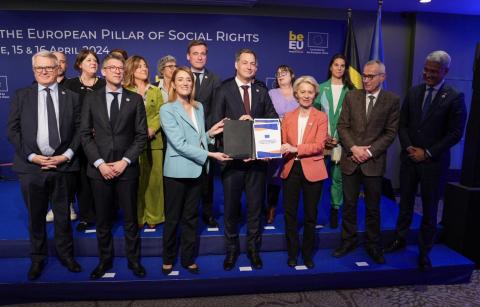European Economic
and Social Committee
EESC President Oliver Röpke signs the La Hulpe Declaration: European Pillar of Social Rights must remain a top priority for the EU and its candidate countries
President Röpke led a delegation of EESC Members from all three Groups (employers, workers, civil society organisations) at the high level conference in La Hulpe. The Belgian Presidency had invited the European Economic and Social Committee (EESC) to sign the Declaration on "The Future of the European Pillar of Social Rights".
Together with the EESC, the declaration was also signed by the Belgian Prime Minister Alexander De Croo on behalf of 25 Member States, European Commission President Ursula von der Leyen, European Parliament President Roberta Metsola, and the leaders of the European Trade Union Confederation, SGI Europe, SME United and the Social Platform.
EESC President Röpke said: "The invitation by the Belgian Presidency to sign the La Hulpe Declaration is an important recognition of the role of the EESC as the House of organised civil society. The European Pillar of Social Rights is of strategic importance not only for the EU, but also for the candidate countries. I look forward to the review of the Action Plan in 2025, to which the EESC will also contribute. Organised civil society must play a crucial role in implementing the European Pillar of Social Rights. I feel honoured to sign this declaration."
The Compass: the European Pillar of Social Rights
Unprecedented challenges, such as the global pandemic and the cost-of-living crisis, have highlighted the crucial role of strong social welfare systems. In a recent survey by the European Parliament, EU citizens identify the economy, social justice, and jobs as their top political priorities ahead of the upcoming European Parliament elections in June 2024.
The La Hulpe declaration aims to provide a compass for social policy in the EU for the coming years. It sets out a comprehensive set of actions to foster equal opportunities, labour market access, fair working conditions, and social protection through EU and national policies.
The declaration also makes reference to the future enlargement of the EU. It highlights the importance to assist candidate countries with the implementation of the social acquis and to foster upwards social convergence. The EESC welcomes this renewed focus on enlargement, in particular against the backdrop of its own initiative to open the doors of the EESC to EU candidate countries by integrating representatives from their civil society into the EESC's advisory work.
Although the EESC Employers' Group did not oppose the signing of the La Hulpe Declaration by the EESC President, it nevertheless stressed important misgivings about the content of the declaration. In particular, the Employers' Group wishes to underline that the declaration cannot be considered or understood as anticipating the position of the EESC Employers’ Group to policies, actions or measures that might be proposed in the field of social policy during the next EU legislative term.
Read my full speech on "Building a Strong Social Europe across Borders".
